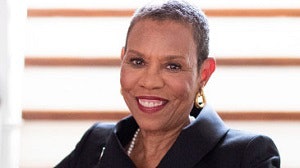Will higher education return to normal after the pandemic, or will it emerge forever changed?
This was the question discussed at a panel on Monday, titled “The Future of Higher Education in a Post-COVID-19 World,” hosted by the Economist Intelligence Unit and the Qatar Foundation, a private non-profit, which have published a new report on the benefits of different higher education models. Panelists used the report as a springboard to discuss how the coronavirus has impacted higher education across borders and what colleges and universities might learn from the crisis.
The Economist Intelligence Unit’s managing director of public policy, Claire Casey, moderated the conversation, which featured Dr. Tim Blackman, vice chancellor of England-based Open University; Ben Nelson, founder, chairman and CEO of Minerva Schools at San Francisco’s Keck Graduate Institute; Francisco Marmolejo, education advisor of the Qatar Foundation; and Dr. Mary Schmidt Campbell, president of Spelman College in Atlanta.
 Dr. Mary Schmidt Campbell
Dr. Mary Schmidt CampbellThe coronavirus “has changed the way we learn, almost overnight,” said Sheikha Hind bint Hamad Al-Thani, vice chairperson and CEO of the Qatar Foundation. “If this pandemic has proven anything, it’s that we as a society can change. Things that were impossible are now possible. And although it feels like the world is collapsing around us, we owe it to our children and grandchildren to change what we know isn’t working.”
Prompted by questions from the moderator and their online audience, panelists shared their hopes for what global higher education might look like on the other side of the crisis.
Blackman, who runs an all-online university based in England, described the pandemic as a chance to use digital tools to make higher education more accessible, or as he put it, “an opportunity to reach out, open up access and really show what higher education can do in a crisis like this.”
His institution, the Open University, has been working to offer free learning options, he said, especially for people who have been furloughed or who have lost their jobs in the economic downturn caused by the coronavirus. He emphasized that the spread of online education can help low-income students who may need to balance work and childcare with their schooling.
However, he and other panelists also acknowledged the challenges to accessibility posed by the digital divide, the rift between students who have access to adequate technology and those who don’t. Blackman gave suggestions to mitigate the problem for the future, like making sure online materials don’t require more bandwidth than necessary and can be accessed on students’ phones.
 Dr. Tim Blackman
Dr. Tim Blackman“Digital media is an incredibly useful way to open up access,” he said.
Nelson stressed that the pandemic isn’t only a time of change for educational technology but for pedagogy. He hopes the challenges of the transition to remote learning will encourage universities to put more resources into teaching instructors how to teach.
“The hard part isn’t the technology … in online teaching,” he said. “It’s the teaching. Most university professors don’t know how to engage students in learning environments. They do that, but they haven’t been trained in it. They haven’t been assessed in it. There’s going to be a reckoning.”
For Campbell, the coronavirus is a reminder that universities could benefit from more partnerships, both with their communities and with one another.
With people of color disproportionately impacted by layoffs and the virus itself, she stressed the importance of colleges collaborating with K-12 schools and other community staples to help during the crisis but also forge lasting connections.
She also advised colleges to collaborate and share resources, instead of being in “marketing and competition mode.”
Spelman College is one of four historically Black higher education institutions in the Atlanta University Center Consortium, but even beyond a consortium model, she said she’d like to see universities in dialogue about what they can contribute to each other, because they share a mission – to “get the most people … the highest quality education.”
Colleges and universities “have to stop being so precious and siloed and sequestered,” she said. “Everybody benefits from that kind of collaboration, but that takes a very different mindset than the one that we have now.”
Although a “significant, grave and complicated time,” Marmolejo sees this as a moment for higher education to challenge its collective mindset on all sorts of ingrained practices, like college rankings or traditional assessments. It’s a time to introduce more creative “flexibility” in higher education, he said.
For every “assumption” undergirding the way universities are run, he wants the sector’s leaders to ask, “Is what we’re doing today really up to the standards of the future?”
Sara Weissman can be reached at [email protected].





















